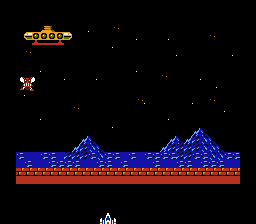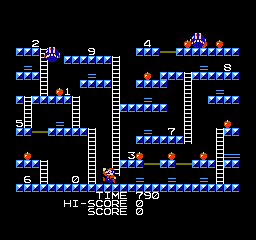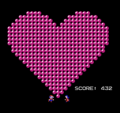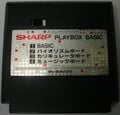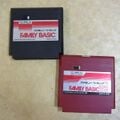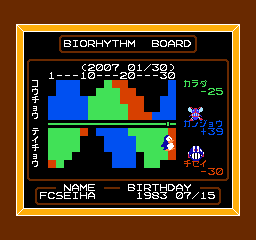Family BASIC: Difference between revisions
mNo edit summary Tag: Mobile edit |
mNo edit summary |
||
| Line 103: | Line 103: | ||
[[Category:1985 games]] | [[Category:1985 games]] | ||
[[Category:Japan-only games]] | [[Category:Japan-only games]] | ||
[[Category:Educational games]] | [[Category:Educational games]] | ||
[[Category:Accessories]] | [[Category:Accessories]] | ||
Revision as of 20:40, December 27, 2024
- This article is about the software and accessory for the Family Computer. For the microgame in WarioWare, Inc.: Mega Microgame$!, see Family Basic (microgame).
| Family BASIC | |
|---|---|
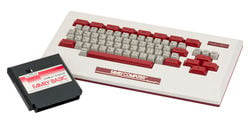
| |
| Developer | Nintendo Hudson Soft |
| Publisher | Nintendo Sharp Corporation |
| Platform(s) | Family Computer |
| Release date | |
| Language(s) | Japanese |
| Genre | Progamming |
| Mode(s) | Single player |
| Format | Famicom:
|
| Input | Famicom:
Home computer system:
|
Family BASIC is programming software for the Family Computer (Famicom) created by Hudson Soft, Nintendo, and Sharp Corporation. It was bundled with the Famicom keyboard peripheral.[3] It was preceded by the nearly identical Playbox BASIC for the Sharp C1 Famicom TV. Family BASIC allowed users to create programs in the NS-HuBASIC programming language, a variation of the BASIC programming language with an "NS-Hu" prefix that stands for Nintendo, Sharp, and Hudson Soft respectively. This accessory came with a specially designed cartridge and keyboard, similar in function to that of a Commodore computer of that era. The keyboard plugs into a 15-pin expansion port on the front of the Famicom.
Family BASIC had the separately sold Data Recorder peripheral, which plugs into the back of the keyboard labeled SAVE and LOAD, and Wrecking Crew was one of the games compatible with it.
Sprites
Many of the sprites and tilesets were taken directly from the Arcade Classics Series version of the Donkey Kong, Donkey Kong Jr., and Mario Bros. There are 16 animated sprites built-in. The following are the only sprites available for programmers:
- Mario - similar to his Mario Bros. design
- Lady - very similar to her Pinball design
- Fighterfly
- Achilles - a bird-like creature, a palette swap of this sprite reappears in the Japanese version of VS. Pinball.[4]
- Nitanita - a smiley face
- Penpen - a penguin resembling the one from the slot windows from Pinball, this sprite will later be edited and reused for Hudson Soft's Famicom port of Binary Land.
- Fireball - from 100 m of Donkey Kong, this sprite will later be edited and reused for Challenger
- Car
- Spinner - a rotational symmetric space ship
- Star Killer - the bulkier space ship
- Starship - the space ship with nacelles
- Explosion effects
- Shellcreeper
- Sidestepper
- Bird - from the Chain Scene of Donkey Kong Jr.
- Laser effects
It is possible to adjust the color of the sprites. The manual gives instructions on how to create Luigi or different colored enemies from the default sprites.
Programmable games in the manual
Before Family BASIC V3, there were no games available from the start. The manual gives instructions on how to create eight sample games.[5]
- Knight - each player controls a chess knight on a chess board. Any spot that has been landed upon becomes unavailable. The aim is to trap the opposing player. It is similar to other "square-removal" chess variants that utilize the knight's tour.[6]
- Super Memory - a memory game similar to Simon.
- UFO - a shooter where the player controls the Starship and faces off against a lone Fighterfly that shoots back. This game comes with the Data Recorder's cassette.
- Route 66 - an endless top-down driving game like Speed Race and Color TV-Game Racing 112.
- Type Master - a typing game
- Turtle - horse betting but on Shellcreepers
- Card - a card matching game similar to N-Mark Spade Panel
- Sample program 8 - a turn-based chase game where Penpen has to grab flags while evading a Nitanita. The manual insists that this is not a game but a tech demo and leaves it unnamed.
Family BASIC V3
Family BASIC V3, released on February 21, 1985, came as a stand-alone cartridge. It has four minigames, all having Super Mario content.
- Game 0 "Heart": There is an outline of a heart that can be filled by speaking or breathing into microphone of controller 2. When done, Mario and Lady will come together. This is reproduction of a cutscene from Sheriff, Nintendo R&D1's 1979 arcade game.
- Game 1 "Penpen Maze": The player controls Penpen on a grid. The object is to collect numbers in order while avoiding two Sidesteppers. Penpen starts off with three traps that can temporarily stun the Sidesteppers.
- Game 2 "Mario World": Mario has to collect numbers sequentially and apples through a single screen of platforms, ladders, and springs while avoiding the two Nitanitas. However, collecting all the items does not end the game. The Time Limit will simply run out, forcing a Game Over.[7]
- Game 3 "Star Killer": This is an endless space shooter on a wraparound screen for 1 or 2 players controlling Star Killer and Starship respectively. Enemies include Spinners, Fighterflies, Fireballs, and Achilleses.
Appearances in Super Mario games
In WarioWare Inc.: Mega Microgame$!, 9-Volt's microgame Family Basic includes the Family BASIC keyboard, where the objective is to type in the requested numbers or letters.
Gallery
Names in other languages
- Family BASIC
| Language | Name | Meaning | Notes |
|---|---|---|---|
| Japanese | ファミリーベーシック[?] Famirī Bēshikku |
Family BASIC |
- Family BASIC V3
| Language | Name | Meaning | Notes |
|---|---|---|---|
| Japanese | ファミリーベーシックV3[?] Famirī Bēshikku Bui Surī |
Family BASIC V3 |
Trivia
- Family BASIC's predecessor, Playbox BASIC, had a biorhythm board instead of a message board as the C1 TV already came with a message board.
References
- ^ Famicom Family Basic. Retro Gamer Team (English). Archived March 31, 2019, 21:09:53 UTC from the original via Wayback Machine. Retrieved September 17, 2024.
- ^ List of Famicom Software. Nintendo DREAM. Retrieved December 3, 2024.
- ^ March 28, 2021. Family BASIC - Putting the "Computer" into the Family Computer. Nerdly Pleasures (English). Retrieved September 17, 2024.
- ^ NintenDaan (August 29, 2019). [Arcade Archives Pinball] First Look (02:12). YouTube (English). Retrieved September 17, 2024.
- ^ Mikasen (April 16, 2019). ファミリーベーシック付属マニュアル サンプルプログラム集. YouTube (Japanese). Retrieved September 17, 2024.
- ^ Randolph, Alex. Knight Chase. Chess Variants (English). Retrieved September 17, 2024.
- ^ STINKY RETRO GAMES (May 8, 2020). スーパーマリオワールドじゃなくてマリオブラザーズじゃなくて。ファミリーベーシック「マリオワールド」に挑戦. YouTube (Japanese). Retrieved September 17, 2024.
| Video game systems and add-ons | |
|---|---|
| Nintendo home consoles | Family Computer/Nintendo Entertainment System (Family BASIC, Family Computer Disk System) • Super Famicom/Super Nintendo Entertainment System (Satellaview, Super Game Boy) • Nintendo 64 (Nintendo 64DD) • Nintendo GameCube (Game Boy Player) • Wii (Virtual Console, WiiWare) • Wii U (Virtual Console) • Nintendo Switch |
| Nintendo handhelds | Game & Watch • Game Boy • Virtual Boy • Game Boy Color • Game Boy Advance • Nintendo DS (Nintendo DSi, DSiWare) • Nintendo 3DS (Virtual Console) • Nintendo Switch |
| Other | MS-DOS • VS. System • Nintendo PlayChoice-10 • Nintendo Super System • Nelsonic Game Watch • Super Mario Bros. Watch • Gamewatch Boy • Philips CD-i • Mini Classics • Triforce • Visteon Dockable Entertainment System • Classics • LodgeNet • Nintendo Sound Clock: Alarmo |
